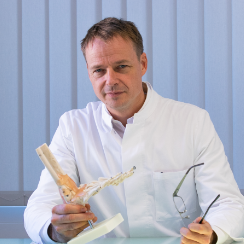One of the most common questions my patients ask me is: How bad is the pain of hallux valgus surgery? Patients are afraid of the pain they may experience during hallux valgus surgery. This is understandable, but the pain is easily manageable with the foot block (local anaesthetic that blocks the nerves of the foot) and other painkillers.
Hallux valgus surgery: How bad is the pain?
The pain after a hallux valgus operation can be kept well under control with pain therapy.
Patients usually feel that the pain they suffered before the hallux valgus surgery was much more unpleasant. After the hallux valgus operation, patients are usually very relieved to have made the decision to have the operation because the quality of life has improved many times over after the hallux valgus operation. Positive effects are, for example, that hobbies and sporting activities such as jogging, hiking, mountain climbing, or simply long walks can be enjoyed again.
Dr. Tonio Gottlieb, MD recommends:
"Please don't wait so long to have hallux valgus surgery until you can't stand the pain anymore. See an experienced foot surgeon or foot orthopaedist early - preferably when you notice the bump on your big toe and there is no pain yet. Why? Hallux valgus surgery is not necessary at an early stage. Often foot exercises, insoles, splints or physiotherapy can help to prevent the bunion or crooked toe from developing further."
But how severe or bad is the pain during a hallux valgus operation?
Pain is subjective and cannot be predicted. As a rule, there is a greater need for painkillers at the beginning, i.e., directly after the hallux valgus operation, which then subsides. If there is pain, combating it works very well with a foot block and targeted painkillers.
Pain therapy - for a good healing process after hallux valgus correction
- Already during the anaesthesia, pain therapy is started with a so-called foot block. Here, the nerves that supply the foot sensitively are injected with anaesthetic and thus blocked. This block lasts for about 6-8 hours. The patient does not notice anything during the phase of the strongest expected pain.
- After that, conventional pain therapy is started even before the subjective pain sensation occurs.
- This is then reduced after 1-2 days to see how much painkillers are needed during the day or at night. Thus, most patients do not feel any pain at all during/after the hallux valgus surgery.
This way, severe pain is unlikely to occur. Your treating foot surgeon will also equip you with different painkillers that are suitable for different pains.
It is often the case that the pain is completely gone a few days after the hallux valgus operation, and you can walk on the operated foot without pain. However, as a patient you should be careful if you are promised or guaranteed absolute freedom from pain under full weight-bearing. Ideally, you should always get a second opinion from a qualified foot specialist before undergoing hallux valgus surgery.
Important: Every operation is individual, and every patient has a different sensation of pain, therefore a possible course of pain after a hallux valgus operation can be completely different for you than you may have heard.
ARRANGE APPOINTMENT WITH TONIO GOTTLIEB, MD, NOW
What you yourself can contribute to a successful hallux valgus operation:
If your hallux valgus operation is imminent because your bunion is already very painful and advanced, then you should consider the right time for the operation. You yourself can contribute a lot to a good outcome and an ideal healing process:
- Allow sufficient time for the healing process after a hallux valgus correction.
- Organise tasks for this healing phase that you can do while sitting or half lying down.
- Create opportunities to immobilise and elevate the operated foot as often as possible.
- Cool the foot several times a day during the first weeks after surgery.
- Go easy on yourself and give yourself more time for tasks that need to be done.
In addition, drinking plenty of fluids, eating healthy food, fresh air and getting enough sleep supports any healing process.



